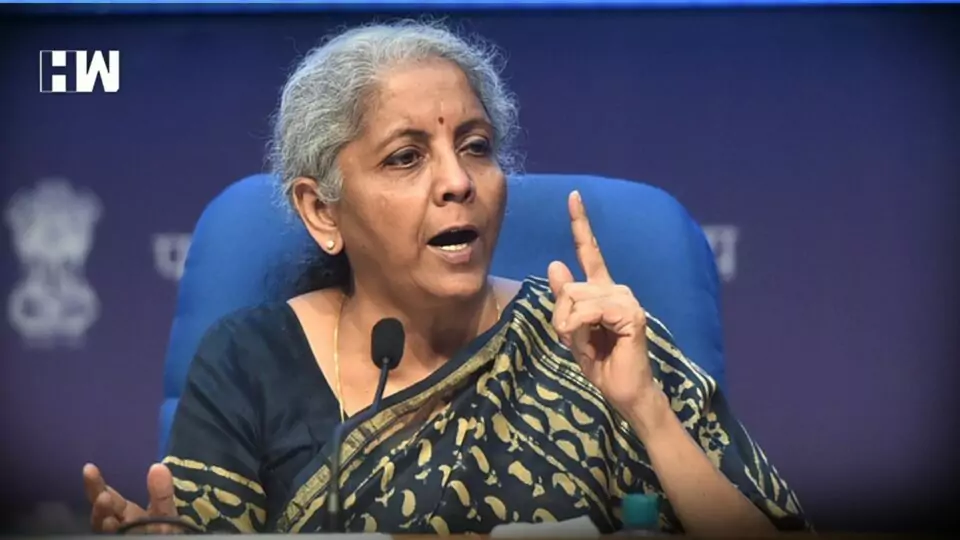Sitharaman said that every participating nation agrees that an unrelenting focus on learning recovery and skill improvement is a must in the wake of Covid-19-led school closures
New Delhi: Union Finance Minister Nirmala Sitharaman participated in a discussion on a paper titled “Learning Losses: What to do about the Heavy Cost of COVID on Children, Youth, and Future Productivity” during Development Committee Dinner meeting of World Bank in Washington DC.
Sitharaman is on an official visit to the US till October 16 In her opening remarks, the finance minister said that every participating nation agrees that an unrelenting focus on learning recovery and skill improvement is a must in the wake of Covid-19-led school closures.
Sharing her India-specific experience, Sitharaman shared two steps that India has undertaken with respect to the impact of the Covid-19 pandemic on the loss of learning.
In November 2021, India conducted the National Achievement Survey (NAS), covering 3.4 million students of grades III, V, VII and X, to evaluate learning competencies. It showed national average performance had dropped to 9 per cent as compared to NAS 2017 for comparable grades.
Also Read: J-K: Meet Shopkeeper Who Rescued Countless From Kashmir’s ‘Valley Of Death’
In March 2022, India undertook a National Foundation Learning Study for grade III students. It was the world’s largest sample for one-on-one assessment and the first time ever that numeracy and comprehension benchmarks based on the Global proficiency Framework in 20 languages were used as a medium of instruction in India.
The Finance Minister, citing the two studies, emphasised these efforts provide not only an authentic assessment of the magnitude of the problem but also drive evidence-based planning for systemic interventions.
The Finance Minister shared these examples with the World Bank so that they can be shared this experience with other countries.
The Finance Minister stated further that India’s digital platform, DIKSHA, which has been identified as one of the 12 Digital Global Goods by India, is now in the public domain.
Last year, Sitharaman said India became the first country in the world to provide QR-coded textbooks to elementary school children through this platform.
The Finance Minister also offered DIKSHA to all interested countries and stated the world Bank can consider this opportunity to scale up digital education globally.
The Finance Minister further stated that India had uploaded the draft National Education Policy based on a 5-year highly participative and multi-pronged consultations. As the Policy was released in July 2020, it was informed by the impact of a pandemic on education and forms the basis for a new National Curriculum Framework.
Further, Sitharaman said that such a highly participative consultation process has generated huge interest in quality learning, the need for foundational skills, the better quality of teaching and learning resources, and skill-based education for every learner. India recently launched the Vidyanjali 2.0 online platform to connect volunteers directly with schools of their choice and help expedite learning recovery.
Sitharaman was pleased to observe that a reference in the paper to India’s GOAL programme, is helping to implement a technology-enabled remedial programme for building foundational skills.
The Finance Minister noted that the paper also references, as a good practice, India’s “Teach at the Right Level” initiative where children are divided into instructional groups based on learning needs, rather than age or grade.
Sitharaman informed the participants that India has also introduced an Alternative Academic Calendar containing a week-wise plan covering syllabus-based learning outcomes. Similarly, to equip teachers India has launched an Integrated Teacher training programme NISHTHA (National Initiative for School Heads and Teachers for Holistic Advancement).
In her concluding address, Sitharaman exhorted the World Bank should use its knowledge power to help countries draw up a Learning Loss Recovery Action Plan in order to avert the prospect of a lost generation, cumulative future economic losses due to lower productivity, earnings and of heightened social unrest.
(Except for the headline, this story has not been edited by HW News staff and is published from a syndicated feed.)
As an independent media platform, we do not take advertisements from governments and corporate houses. It is you, our readers, who have supported us on our journey to do honest and unbiased journalism. Please contribute, so that we can continue to do the same in future.

